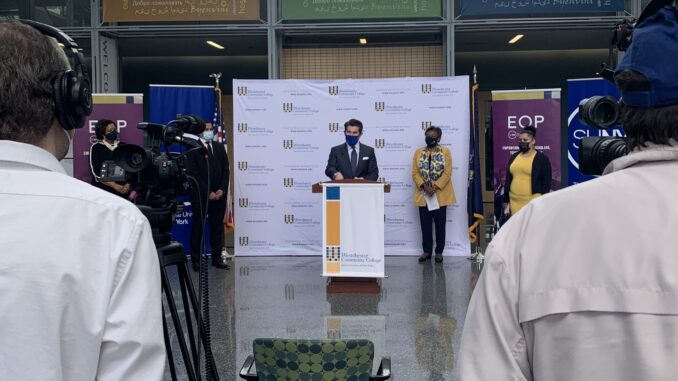
The Educational Opportunity Program (EOP) is being expanded as the result of a 20% increase in funding to the program. EOP provides financial aid, academic support and increased access to schooling for over 77,000 students from economically disadvantaged backgrounds. Many students in the EOP are first generation students and students of color.
The EOP was created in 1967 by Assembly Deputy Speaker Arthur O. Eve and his Chief of Staff Norman R. McConney Jr. It has a reputation as one of the United State’s most successful college access programs and plays an important role in many SUNY students’ access to higher education. SUNY’s EOP students receive their Bachelor’s degree at a rate of 74% within six years, compared to the 62-66% rate amongst students who attend non-SUNY colleges. The new funding being awarded to the program allows for hundreds, if not thousands, more new students to join the EOP.
This is the first new investment the program has received in five years and the greatest expansion since EOP began. $6.4 million was set aside in the 2022 state budget to expand EOP to additional SUNY’s and increase the student resources offered in the program. The expansion will increase student resources to help EOP students get their Associate and Bachelor’s degrees, as well as in perusing doctoral programs.
New York State Senator Shelley B. Mayer said, “The COVID-19 pandemic has been devastating for many college students, particularly our low-income students. My colleagues and I worked hard to increase EOP funding in the 2021-22 budget, and I commend SUNY’s work to use that funding to increase access, retain, and reconnect with students. The EOP has been a model for providing opportunity for students who would otherwise not have access to higher education.”
The new funding will increase EOP enrollment of up to 1,000 more students than there were in the 2020-21 program year, increasing from 8,000 to 9,000 students. Additionally, 10 SUNY community colleges do not have an EOP, but SUNY plans to establish EOP’s at five SUNY community colleges this year to expand the reach of EOP to even more students. SUNY will also start their first ever spring semester EOP cohort, while previously incoming EOP students only had the option to start during the fall semester.
SUNY is also establishing a $2 million Student Persistence Fund to decrease dropout rates among EOP students. The funds will be used to help students at the greatest risk of dropping out due to unforeseen financial circumstances by giving financial aid of $50-$2,000 per student. SUNY will also increase the funding per EOP student at each campus, increasing from $2,600 to $2,800 per student. This money will go towards additional academic support and counseling and direct financial aid.
Funding is being used to double SUNY’s new Pre-Medical Opportunity Program, which was announced in July 2020, to include up to 75 pre-medical students. The funds will be used to cover the costs of the summer program, which include transportation, instruction and room and board. A new EOP Students Ambassadors Program will be created to offer EOP students additional support and increase recruitment efforts. There will be a first class of 20 student ambassadors who will represent SUNY campuses. As well as an increase in resources and counselors to meet student needs, including the purchase of an additional 890 laptops for students to close technological gaps and 15 more counselors who will be hired across SUNY campuses to assist EOP students.
Expanding EOP was a priority in the 25-Point Diversity, Equity, and Inclusion Action Plan approved by the SUNY Board of Trustees and SUNY Chancellor, Jim Malatras.
“For decades, the Educational Opportunity Program has helped tens of thousands of students graduate from college and go on to successful careers… Today, because of the historic state investment, we are increasing access, programming, resources, and support that will be there for students where they are and when they need it so that no student is left behind,” Malatras said.
President Donald P. Christian noted that while the increase in funding is a good start, a greater increase in EOP stipends would have made a significant difference, “I’ll just say I wish it were more. The EOP stipends for current students have not grown to the degree that they should, compared with the rising costs of college, but any increase is a good sign for EOP students. Students overcome both financial challenges, as well as academic challenges, typically, because they’ve attended poorly funded urban or rural high schools, but they’re students who have great potential for academic success, so we’re proud of the success of our EOP students in the program.”
President Christian also noted that the expansion of EOP to more SUNY community colleges is significant because half of SUNY New Paltz’s graduates each year have come from transfer colleges, most typically being SUNY community colleges. He told The Oracle, “Having EOP programs that more of the students in community colleges can be part of when they’re there, and then transfer here and continue EOP will surely contribute to success.”
Juthi Roy, undeclared first-year student and member of SUNY New Paltz’s EOP, said, “I think it’s amazing that the EOP is receiving more funding just because it’s such a great opportunity for so many first generation American students to get a college level education, which many of our parents didn’t get the opportunity to have. In a way, it makes all the sacrifices that my parents had to make worth it.”

